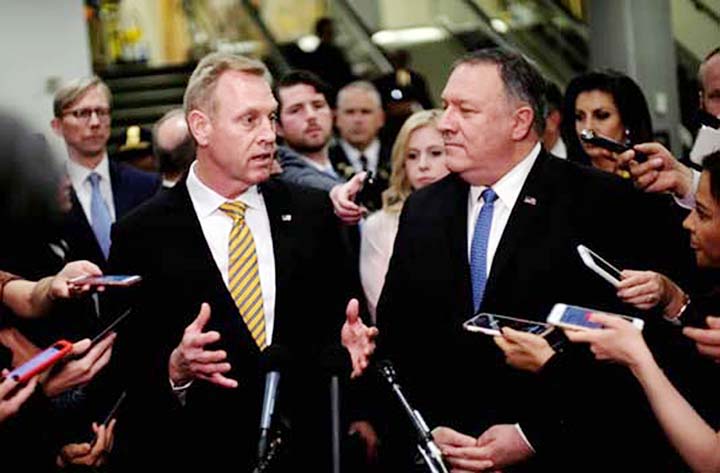
AP, Washington :
Top Trump administration officials have told Congress that recent actions by the U.S. have deterred Iranian attacks on American forces. But some lawmakers remain deeply skeptical of the White House approach in the Middle East.
After Tuesday’s closed-door briefings on Capitol Hill, Secretary of State Mike Pompeo and Acting Defense Secretary Patrick Shanahan said their objective over recent days has been to deter Iran.
Shanahan says they now want to prevent further escalation, telling reporters, “We’re not about going to war.”
He says the administration’s goal “is to prevent Iranian miscalculation,” adding, “We do not want the situation to escalate.”
Democrats are particularly concerned the administration may try to rely on nearly 20-year-old war authorizations rather than seek fresh approval from Congress for any action.
Acting Defense Secretary Patrick Shanahan is trying to assure lawmakers that the administration is not rushing toward a military confrontation with Iran.
Shanahan says he outlined during closed-door briefings Tuesday what the Pentagon has done since receiving “credible intelligence about threats to our interests in the Middle East and to American forces.” He said, “This is about deterrence, not about war.”
Secretary of State Mike Pompeo briefed lawmakers alongside Shanahan and said he placed recent intelligence about Iran “in context.”
The briefings on Capitol Hill came after weeks of escalating tensions in the Persian Gulf. Lawmakers have criticized the administration for not communicating with Congress while responding to the threat. Many have warned that the Trump administration cannot go to war without authorization from Congress.Secretary of State Mike Pompeo and other top Trump administration officials are briefing Congress behind closed doors about the situation in Iran.
Pompeo, acting Defense Secretary Patrick Shanahan and Gen. Joseph Dunford, the chairman of the Joint Chiefs of Staff, presented a classified briefing Tuesday.
to House lawmakers to mixed results.
Some Republicans say what they heard backed up President Donald Trump’s recent actions in the Persian Gulf. The U.S. has sent an aircraft carrier and other resources to the region amid undisclosed threats officials indicated are linked to Iran.
But Democrats say they left the session with more questions than answers. Some Democrats appeared skeptical of the administration’s strategy.
The administration officials were briefing senators next in a separate closed-door session.
The US defense chief said President Donald Trump’s administration was seeking to deter Iran but not start a war, after he briefed members of Congress.
“This is about deterrence, not about war. We are not about going to war,” Acting Defense Secretary Patrick Shanahan told reporters after exiting the closed-door meeting with Secretary of State Mike Pompeo.
Shanahan credited robust US moves in recent weeks, which included the deployment of an aircraft carrier strike group, with thwarting Iranian threats.
“We have deterred attacks based on reposturing of assets, deterred attacks against American forces,” Shanahan said.
“Our biggest focus at this point is to prevent Iranian miscalculation. We do not want the situation to escalate,” he said.
Pompeo said that he and Shanahan placed Iranian actions within the context of “40 years of terrorist activity,” since the 1979 Islamic revolution replaced the pro-Western shah with a staunchly anti-US clerical regime.
The briefing did not satisfy many of the Democrats, who say that the heightened tensions are the results of President Donald Trump administration’s aggressive stance and shunning of diplomacy.
“I worry very much that, intentionally or unintentionally, we can create a situation in which a war will take place,” Senator Bernie Sanders, an independent running for the Democratic presidential nomination, told reporters.
Saying that the Iraq and Vietnam wars were based on lies by previous administrations, Sanders said: “I believe that a war with Iran would be an absolute disaster, far worse than the war with Iraq.”
The situation in Iran was also discussed by German Chancellor Angela Merkel, French President Emmanuel Macron, and Russian President Vladimir Putin in a telephone call, Merkel’s office said in a statement on May 21.
Russia, France, and Germany, along with Britain and China are part of the 2015 accord.
The statement said that the three leaders “underlined the need to persuade Iran to remain in the nuclear agreement, which they agreed to maintain.”
Iranian President Hassan Rohani said in a live TV broadcast on May 21 that “the Iranian nation will not be defeated by America, the White House could not defeat the Iranian nation.”
Referring to the recently imposed U.S. sanctions, Rohani said, “But at the end of the road, the victory is ours.”
On May 20, Rohani said that he was seeking expanded, wartime executive powers to deal with an “economic war” being waged against the country by the United States, according to the official IRNA news agency.
Rohani cited the devastating war with Iraq from 1980 to 1988, when a Supreme Council of War was able to bypass other branches to make decisions regarding the economy and the war effort.

